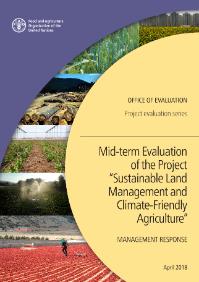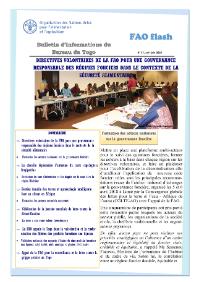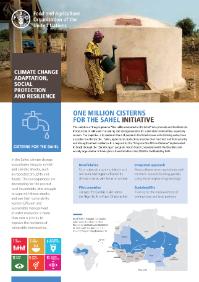Focal point
Location
The Food and Agriculture Organization of the United Nations leads international efforts to defeat hunger. Serving both developed and developing countries, FAO acts as a neutral forum where all nations meet as equals to negotiate agreements and debate policy. FAO is also a source of knowledge and information. We help developing countries and countries in transition modernize and improve agriculture, forestry and fisheries practices and ensure good nutrition for all. Since our founding in 1945, we have focused special attention on developing rural areas, home to 70 percent of the world's poor and hungry people.
Members:
Resources
Displaying 336 - 340 of 5074Mid-term Evaluation of the Project “Sustainable Land Management and Climate-Friendly Agriculture” - Management Response
The “Sustainable Land Management and Climate-Friendly Agriculture” Project was implemented in Turkey to improve the sustainability of agricultural and forest land use in the area by rehabilitating degraded forests and rangelands, promoting climate-smart agriculture and establishing a favourable enabling environment. The project was designed to develop the necessary strategies, plans, tools and mechanisms that will aid stakeholders in sustainably managing forest and land resources.
FAO Flash - Bulletin d'informations du Bureau du Togo n° 37, Avril - Juin 2018
FAO is stressing on the communication as an effective tool for disseminating the information for advocacy and resources mobilization in the fight against hunger and food insecurity to achieve its strategic objectives. In this regard, communication tools are edited on a regular basis by the FAO country office in Togo to ensure a better visibility of field projects at the country level. One of these tools is FAO Flash, an electronic newsletter to share information with the various partners on field activities implemented to the benefit of target groups.
One million cisterns for the Sahel initiative
This brochure highlights the objectives and key information of the FAO project entitled “One million cisterns for the Sahel”. It aims to illustrate the project activities’ expected positive impacts in terms of food security, agricultural activities and nutrition among beneficiairies. The objective is to inform FAO partners and donors on this innovative initiative aiming to introduce rainwater harvesting and storage systems at the community level.
Fortalecer Las Políticas Sectoriales Para Mejorar Los Resultados En Materia De Seguridad Alimentaria Y Nutrición
La tierra, la pesca, los bosques y otros recursos naturales proporcionan una base para los medios de vida y las prácticas sociales, culturales y religiosas. Sin embargo, la mayoría de las personas en las zonas rurales de los países en desarrollo no tienen ningún tipo de documentación para proteger sus tierras y sus derechos a los recursos naturales, lo que pone en peligro sus medios de subsistencia y, en consecuencia, su seguridad alimentaria y nutricional.
Saint Vincent and the Grenadines and FAO
Saint Vincent and the Grenadines joined FAO in 1981. Early assistance was delivered through a range of interventions focusing on capacity building, policy formulation, agricultural planning and legislation development. More recently, interventions have addressed food security programmes, technology transfer for improved production and strengthening of market infrastructure. A major feature of current cooperation is resilience building in the face of climate change.











